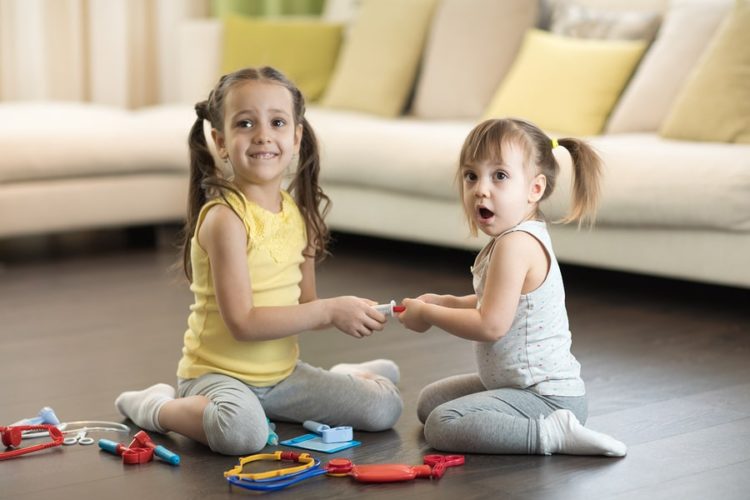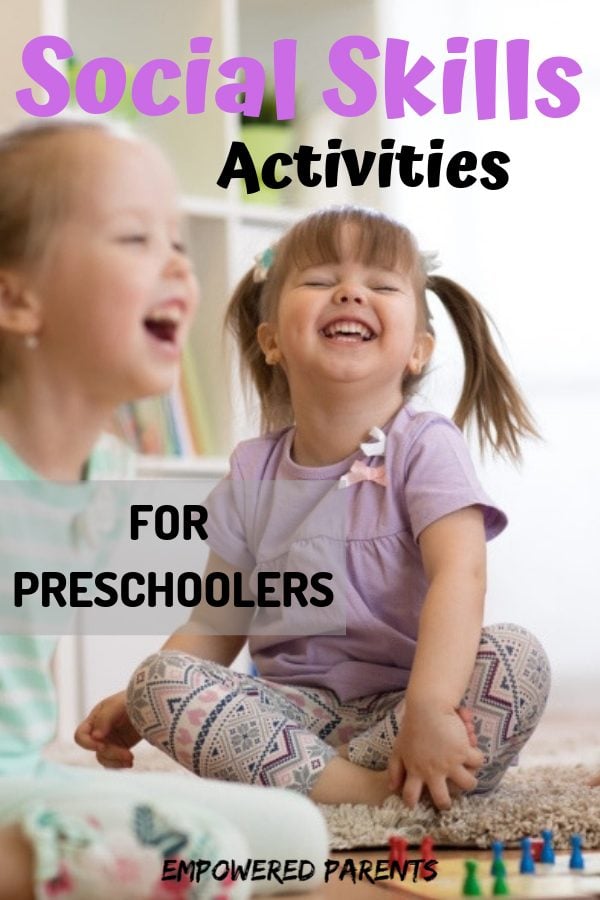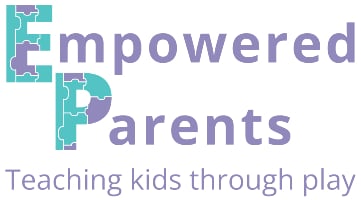The foundation for a person’s social behaviour is laid during the early years, which makes preschool a crucial time to ensure your children are learning social skills.
In this article I’ll explain briefly:
- why social skills are important
- examples of social skills for preschoolers
- the stages of social development
- social milestones by age
- 13 social skills activities for kids
The Importance of Social Skills
Developing social skills in preschoolers is vital in order for them to be able to interact with others successfully and form healthy relationships throughout life.
As children grow, they learn about social roles, values and behaviours from the world around them.
Parents, siblings, extended family, peers and teachers all have a role to play in moulding children’s social skills.
Healthy socializing involves three general things – generosity, helpfulness and taking turns.
Generosity
Generosity is about sharing with family as well as friends. Children must also learn to respect others’ rights and possessions.
Helpfulness
Learning to be friendly, considerate and helpful must be balanced with not being overly submissive and stifling the development of their own personalities.
Taking Turns
This is one of the most important skills to learn. It is the basis of courtesy and thoughtfulness and is relevant at almost every level of life.
Children must allow others to have their turn but also have the self-confidence to insist on getting their own turn, without trying to dominate activities and conversations. The example parents set is important.
The social and emotional development of a child is an important aspect of their growth, just as much as intellectual or physical development, which we tend to pay more attention to.
Examples of Social Skills
Children need to build a set of prosocial skills in order to navigate communicating with others and building relationships.
Here are some examples of social skills, as shared by Marike de Witt in her book “The Young Child in Context: A psycho-social perspective“:
- Cooperating
- Being helpful
- Compromising
- Giving
- Sharing
- Taking turns
- Negotiating
- Showing sympathy
- Having empathy
- Imitating
- Protecting
- Assuming responsibility
- Respecting others’ views
- Showing attachment
Antisocial behaviours prevent children from communicating effectively. These are a few examples:
- Selfishness
- Telling lies
- Aggression
- Egocentrism
- Taking others’ possessions
- Bossiness
- Destructiveness
- Prejudice
The Stages of Social Development in Early Childhood

In order to help children build social skills, it is necessary to first understand the social stages and milestones they will progress through so you can support them at their stage of maturity.
For example, there is no need to worry that your 2-year-old won’t share his toys as this is normal at his age. He is not yet mature enough to understand the concept of sharing.
De Witt divides social development into three main stages: the Infancy, Childhood and Youthful periods.
Infancy Period
This stage begins at birth and ends at the first signs of speech. During this stage, infants learn to tell the difference between their own bodies and the environment around them.
Social development is strongly influenced by the mother-child relationship because the way a mother cares for her child will either convey tenderness or anxiety.
Childhood Period
The childhood period begins when a child uses clear speech and lasts up until the need for playmates of the same age emerges.
By following the example set by the parents, a child begins to classify his own behaviour as good or bad. He also realizes the difference between enemies and friends.
During this stage, children acquire language as well as cultural customs, such as hygiene, toilet or eating practices.
Youthful Period
This period begins when children prefer to play with others of the same age. More complex skills of interpersonal behaviour are learnt, such as cooperation, competition and compromise.
Social Development Milestones by Age
Here is a table of common milestones that occur at various ages as a child matures. It is a summary of the milestones in the book “The Young Child in Context: A psycho-social perspective“.
12 Months
- Shows affection for people she knows
- Likes to be around loved ones – to always hear or see them
- Passes an object or toy to an adult when asked, and sometimes even spontaneously
- Waves goodbye
- Begins to play games such as hide-and-seek
18 Months
- Plays alone happily but likes to be near a familiar adult or older sibling
- Likes other children but does not play with them
- Shows affection for family members, pets and dolls
- Begins to imitate people
- Repeats actions and expressions that receive a positive reaction
2 Years
- Likes people but is still egocentric
- Follows caregivers around the house and demands constant attention
- Imitates domestic activities
- May take turns but has difficulty sharing toys or adult attention
- Throws tantrums in order to be understood
- Happily plays near other children, but not yet with them (parallel play)
- Sometimes hits or bites children to get a reaction
- Can role play e.g. put a doll to sleep or wash the dishes
3 Years
- Begins to behave unselfishly
- Shows affection for younger siblings
- Likes helping with domestic activities such as shopping or cleaning
- Begins to share with others
- Enjoys playing alone and with other children
- Begins to show a preference for certain friends
- Begins to show sympathy when someone is upset
- Engages in make-believe play with dolls and toys and enjoys pretending to be someone else
- Still sees most things from their own perspective
- Talks about self, family and possessions
- Shows empathy with characters in stories
- Can wait for you to finish before talking
- Sometimes has an imaginary friend
4 Years
- Really enjoys the company of friends and can play in a group
- Often has a best friend
- Is strong willed
- Begins to form a sense of humour
- Understands taking turns and sharing
- Shows concern and sympathy towards younger siblings and friends
- Engages in dramatic make-believe play
- Becomes competitive
- Social skills develop such as – saying please and thank you (if taught), greeting people, talking to them, and showing respect towards others in the home
5 Years
- Behaves in a more controlled and sensible way
- Cooperates with companions and understands the need for rules and fair play
- Has a definite sense of humour
- Shows tenderness towards and is protective of younger children and pets
- Enjoys competitive games
- Enjoys fantasy games
- Chooses own friends (usually of the same sex)
- Begins to learn the value of compromise and negotiation
As you can see, sharing is a struggle for very young children. The advice is usually to divert and redirect attention when dealing with toddlers [source].
The Importance of Play in Social Development
The most important activity your children can engage in, in order to develop their social skills, is play.
When preschool children play together they learn together.
Here are some reasons play is important for your child’s social development.
- It teaches cooperation and how to take turns
- Children are able to try different roles and personalities
- Play teaches children to verbalize their needs
- Kids learn to lead and follow
- It provides a broad base for the use of social language skills
- Children learn to respect others’ rights and possessions
- They develop an awareness of themselves as a member of a group
- Through play, they understand their own culture and values
- They gain knowledge about society’s rules and about group responsibility
- Play develops a positive self-image and self-concept
- It teaches how to participate in a group
- It promotes gender-role identification
- Children develop common goals and interests as they play together
- They learn to see others’ perspectives
- Children experience delight when playing
13 Social Skills Activities for Preschoolers
If you are wondering what activities would be most effective to help a child develop positive social skills, the answer is that you don’t really need a list of specific activities to “teach” them about socializing.
Rather, it is about giving them enough opportunities to play and interact and encouraging certain types of games and activities that involve interaction and cooperation.
You can discuss or play social skills games around topics like feelings and how to cope with conflict, but it will only be through experiencing these feelings and conflicts that your children will really learn these lessons and understand these concepts in a meaningful way.
Here are some simple social development activities for 3-5-year-olds.
1. Playdates
Invite friends over for a playdate and take your children to play with friends as often as you can. Playing with siblings is also good interaction.
The more opportunities your child has to mix with others, the more they will practise socializing.
Don’t leave your young child alone with a friend if he is not yet comfortable. Give him time to build trust.
2. Group Games
Play group games that involve taking turns and following rules.
Children will learn with time that social interaction is fun and that in order for the game to work, they need to consider each other and all be active participants.
Also, encourage musical games such as musical chairs where there are rules to follow and children have to compete while still considering each other and being comfortable with losing sometimes (e.g. if your friend gets to a chair before you).
This takes maturity to understand.
3. Board Games
Board games are an excellent activity for older preschool children. These should have multiple players (even if you start with 2), rules and an objective (e.g. in Snakes and Ladders the objective is to reach the end first).

It can be a complex task for a child to learn to follow rules and keep the game positive while competing with friends or family members.
Younger children can start with simple card games or very basic board games.
4. Fantasy Play
Fantasy, or dress-up play, is an important part of learning to socialize. During this kind of play, children make sense of their world and the people around them by role-playing.
This is how they “practise” being an adult, behaving and interacting as an adult would. They also act out their own social customs and norms.
Fantasy play is a great social learning activity for children playing with one or more friends, as well as for smaller children playing alone.
Even though the child is alone, the activity revolves around pretending to interact with others, which is a great way to safely act out an interaction.
Provide opportunities at home by having a dress-up section in your child’s room. Provide different themed clothes and props and change them frequently to encourage new ideas.
5. Blocks
When children play with blocks together, they initially play alongside each other, building their own structures.
With time and maturity, they begin to share blocks, take an interest in each other’s structures and finally end up building something together.
This is one of those activities where you will see this progression clearly.
By the time children are building together, they are learning to share, listen to each other’s ideas, problem-solve, organize, share opinions, negotiate, compromise and work towards a common goal.
6. Sensory Play
Sensory play is a fun activity that children love to do together. Whether they are playing with water, mud or sand, there is much sharing, negotiating and cooperation. It also often leads to fantasy play.
7. Creative Play
When children are involved in creative activities such as drawing, painting, cutting, pasting or moulding playdough, they are often deep in conversation at the same time.
These activities usually happen around a table where the children are sitting calmly and are fully engaged with their playmates.
Some of the most intriguing and complex socializing I have witnessed has been around an art table.
8. Reading
Reading to children is my absolute favourite activity and one with so many benefits. Stories are all about people and animals and their relationships and interactions.
Read to your children daily and they will constantly be listening to how characters socialize, deal with problems, show emotions and generally interact.
You may find it hard to explain to a young child what empathy is, for example, but you can certainly teach the message with a story and let your child experience this trait on their own through listening.
9. Discussions
Along with reading, discussions are another way to teach your children social skills.
Use every opportunity possible to discuss how your children feel, to talk about their friendships and even discuss the characters in the stories and how they handled certain situations.
When your children experience conflict with a friend, discussing possible solutions or how they can handle it is a far more educational experience than immediately intervening.
10. Manners
In my experience teaching in the classroom, the children who had lovely manners were taught at home as toddlers. Those who hadn’t been taught seldom spontaneously said please or thank you without being constantly prompted and reminded.
It is too late to teach a 3 or 4-year-old manners and courtesy. Start as early as possible.
11. Free Play
The best socializing and learning occurs naturally – when children are playing freely with each other.
You may choose to present and encourage certain activities, such as an art project, but know that any time spent playing with others is time they are learning valuable social skills.
Try not to let screen time or too many planned activities get in the way of real play and socializing.
…and don’t forget these two important points:
12. Build a Healthy Relationship With Your Child
A child’s primary relationship – with his parents – is the basis for all future socializing.
The relationship should be warm and close. Your child should feel love, security, acceptance, trust and self-esteem.
13. Model Positive Behaviour
Children learn about socially acceptable behaviour by watching their parents. They learn more from watching you than from listening to you.
I hope you enjoyed these ideas and activities for developing social skills in preschoolers.


Phumzile
Thursday 13th of June 2024
This social development activities helping me so much as ECD practitioner. I will observing children in social development correctly. Thank you so much I learn a lott
Tanja McIlroy
Saturday 15th of June 2024
You're welcome, Phumzile! Thanks for your comment.